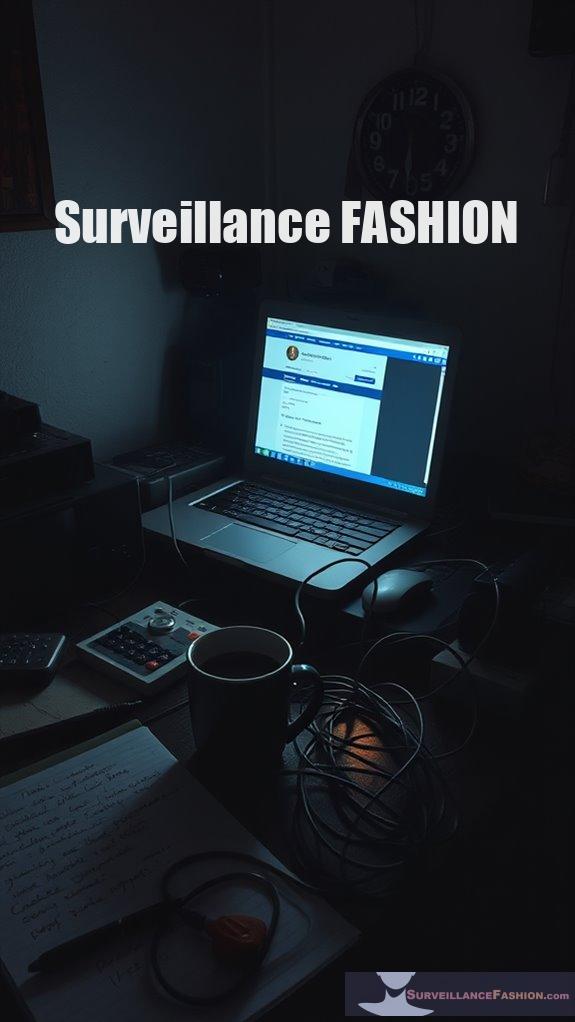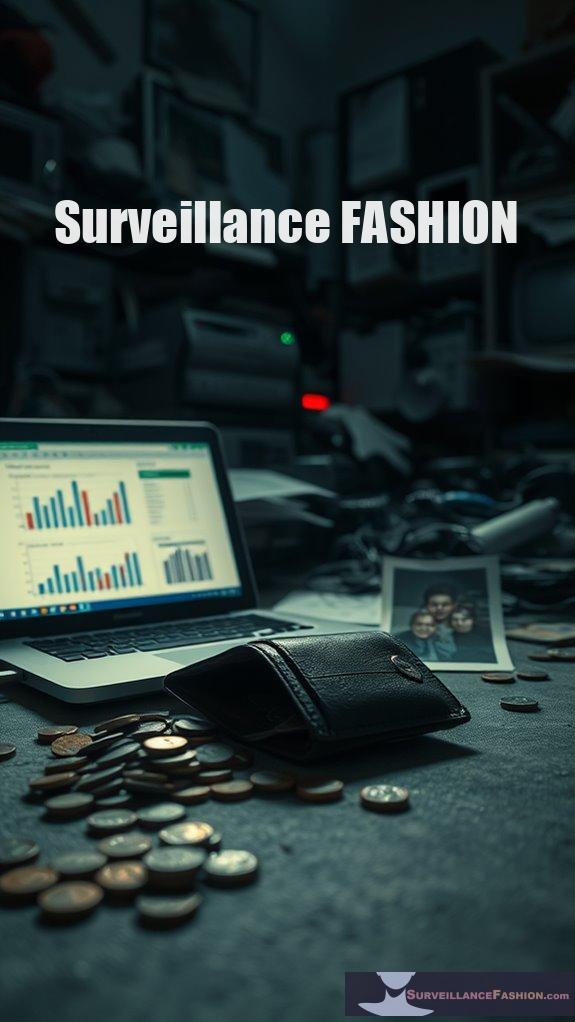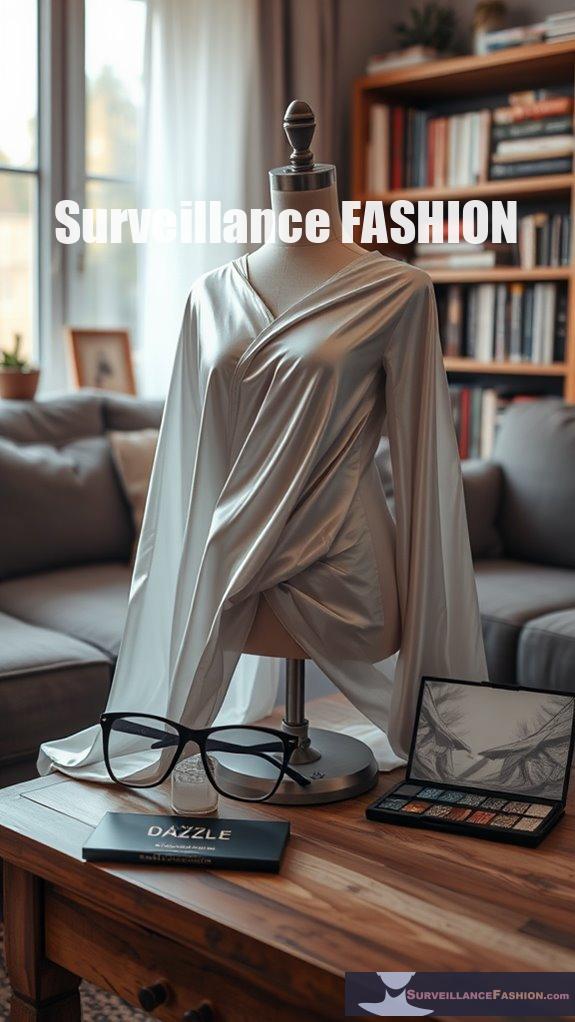Surveillance capitalism invades your life through various mechanisms, particularly unconsented data collection that compromises your privacy. It manipulates consumer behavior by predicting actions, based on past interactions, evident in e-commerce's dynamic pricing. Economic disparities arise from monopolistic practices, with powerful corporations commodifying personal data for profit, undermining individual agency. Ethical concerns surface due to regulatory gaps, making exploitation easier. As awareness spreads, the rise of anti-surveillance fashion and eco-friendly clothing emerge as proactive responses, encouraging more informed consumer choices. Exploring these trends further reveals the complex relationship between personal privacy and fashion innovation.
Quick Takeaways
- Surveillance capitalism collects personal data without consent, creating detailed profiles that manipulate consumer behavior and decision-making processes.
- Algorithmic influence tailors content and advertisements to users, often leading to choices misaligned with their true preferences.
- E-commerce platforms adjust prices and recommendations in real-time based on user behavior, undermining individual agency and empowerment.
- The commodification of personal data fosters economic inequality, as wealth becomes concentrated among corporations that exploit consumer information.
- Regulatory gaps in privacy laws allow powerful entities to manipulate behavior, perpetuating social inequalities and eroding trust in online environments.
Data Collection Without Consent

How often do you consider the implications of data collection happening without your explicit consent? Many tech giants, like Google, utilize both active and passive methods, collecting data through your interactions and background processes unbeknownst to you.
For instance, web browsers and mobile apps track your behavior via cookies, creating detailed profiles that support the machinery of surveillance capitalism. A staggering 38% of websites engage in this practice, undermining your autonomy and privacy while contributing to a growing distrust in digital platforms. Furthermore, non-compliance can damage your trust and company reputation, highlighting the urgency for better data practices. The manipulation of consumer behavior through this data tracking exacerbates the issue, leading to choices that may not align with your true preferences.
The inconsistency in global laws, such as the GDPR and CCPA, leaves you vulnerable. As public awareness rises, the need for stronger regulations becomes apparent, underscoring the importance of platforms like Surveillance Fashion that advocate for your rights in this digital environment.
Manipulation of Consumer Behavior

As you navigate the digital environment, the subtle yet pervasive manipulation of your consumer behavior often goes unnoticed, shaping your preferences and choices in ways that can feel almost instinctual.
Algorithmic influence, driven by artificial intelligence, tailors content specifically aimed at engaging you, while behavioral analysis uncovers patterns in your interactions to predict your next move.
For instance, when you browse an e-commerce site, real-time data processing adjusts prices and product recommendations based on your past behaviors, creating a customized shopping experience.
Moreover, gamification techniques keep you hooked, subtly altering your decision-making process.
Ultimately, understanding these strategies not only empowers you but also aligns with our mission at Surveillance Fashion: to illuminate the pervasive forces shaping your consumer environment.
Erosion of Personal Privacy

Although you mightn't realize it, the erosion of personal privacy in today's digital environment is a consequence of pervasive data collection practices that have become embedded in many aspects of daily life.
Every time you interact with a smart device, from your smartphone to your home assistant, it silently collects vast amounts of data, including your preferences and daily routines, often without explicit consent. This data, aggregated with information from various apps, creates detailed profiles that tech companies use to predict and manipulate your behavior.
Moreover, the lines separating your online and offline activities blur, leaving you vulnerable to institutional data collection by banks, schools, and health providers. This ripple effect of data collection extends beyond individual privacy, influencing social bonds and community trust as individuals become more guarded in their interactions.
As we explore these issues on Surveillance Fashion, understanding this erosion is vital for reclaiming your autonomy in an increasingly surveilled world.
Economic Disparities and Market Dynamics

While the rise of surveillance capitalism reshapes market dynamics, it simultaneously exacerbates economic disparities, creating an environment where only a few corporations thrive at the expense of broader societal equity.
Corporations, by commodifying personal data, establish dominance that stifles competition and innovation, particularly for smaller entities. This data monopoly leads to significant barriers for newcomers, while wealth concentration further entrenches economic inequality across diverse groups.
Corporations commodify personal data, creating monopolies that hinder competition and deepen economic inequality across communities.
Behavioral futures markets exemplify how predictions about consumer behavior shape market strategies, often prioritizing profit over societal good. The ethics of mass surveillance play a crucial role in understanding the long-term implications of these practices on individual freedoms and societal structures.
As you navigate this environment, understanding the implications of targeted advertising and algorithmic pricing becomes essential. This awareness is vital for reclaiming agency in a system designed to prioritize corporate interests over personal empowerment, a core tenet of our mission at Surveillance Fashion.
Regulatory Gaps and Ethical Implications

The regulatory environment surrounding surveillance capitalism remains fraught with significant gaps, which ultimately undermines individual privacy rights and societal equity.
While the General Data Protection Regulation (GDPR) represents a pivotal effort in data protection, inconsistencies across global jurisdictions weaken its effectiveness, leaving many unprotected.
With corporations exploiting legal loopholes, ethical concerns arise regarding data commodification and behavioral manipulation, which erode individual autonomy.
The alarming knowledge asymmetry fosters social inequalities, as powerful entities leverage personal data to influence behavior and outcomes without transparent consent.
To combat these issues, stronger antitrust laws and enhanced regulatory frameworks are essential.
As surveillance practices have evolved, historical evolution highlights the ongoing struggle for privacy rights.
As we explore how anti-surveillance fashion can serve as a form of resistance, we must recognize the urgent need for collective awareness and action against these ethical violations.
How Does Anti-surveillance Fashion Work?

Surveillance capitalism's encroachment on daily life has motivated individuals to explore innovative countermeasures, among which anti-surveillance fashion stands out as a multifaceted approach to protecting personal privacy.
This fashion movement employs various design principles and techniques to outsmart surveillance technologies, emphasizing both functionality and aesthetics. Here are some methods you might encounter:
- CV Dazzle: Makeup patterns that confuse facial recognition algorithms.
- Hyperface: Textiles featuring patterns that mimic facial features to distract recognition software.
- Stealth Wear: Garments made from materials that reflect thermal radiation to evade drone surveillance.
- Privacy Eyewear: Devices that block infrared facial recognition, ensuring your identity remains shielded.
Additionally, many practitioners of CV Dazzle makeup have developed intricate techniques to enhance the effectiveness of their disguises.
Eco-friendly Anti-surveillance Clothing

As you navigate the complex terrain of privacy in today's world, eco-friendly anti-surveillance clothing emerges as a compelling intersection of sustainability and personal security.
These garments utilize recyclable materials, fundamentally reducing textile waste while simultaneously challenging surveillance mechanisms.
Eco-friendly anti-surveillance clothing combines recyclable materials to minimize waste while actively resisting surveillance technologies.
Incorporating designs that confuse facial recognition software, they blend innovation with aesthetic appeal, showcasing patterns that evoke a sense of eco-awareness.
Fabric technologies, such as signal-blocking capabilities for RFID protection and thermal imaging resistance, further enhance your personal security.
Available on platforms like Etsy, these unique pieces embody a growing movement toward ethical fashion, encouraging you to make meaningful, informed choices. Moreover, the rise of data-resistant fashion trends reflects a broader cultural shift towards privacy-conscious consumerism.
References
- https://www.britannica.com/topic/surveillance-capitalism
- https://www.workovereasy.com/2019/04/10/book-club-24-shoshana-zuboffs-the-age-of-surveillance-capitalism/
- https://www.techtarget.com/whatis/definition/surveillance-capitalism
- https://www.youtube.com/watch?v=9cGBJiyl7Qw
- https://www.youtube.com/watch?v=xBpLWa4CNog
- https://www.equancy.fr/en/news/38-of-websites-collect-data-without-consent
- https://www.dre.vanderbilt.edu/~schmidt/PDF/Schmidt-Survelliance-Capitalism-v2.pdf
- https://usercentrics.com/knowledge-hub/data-is-the-new-gold-how-and-why-it-is-collected-and-sold/
- https://news.harvard.edu/gazette/story/2019/03/harvard-professor-says-surveillance-capitalism-is-undermining-democracy/
- https://www.ibm.com/think/topics/data-privacy-examples

Leave a Reply